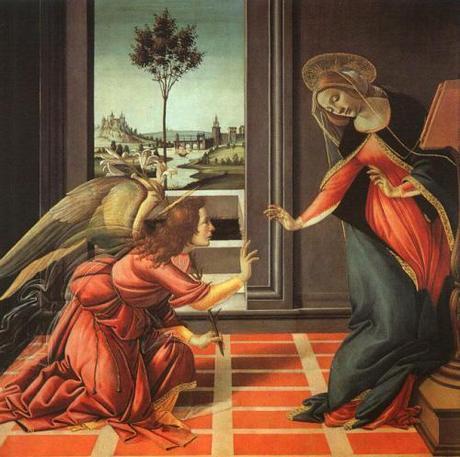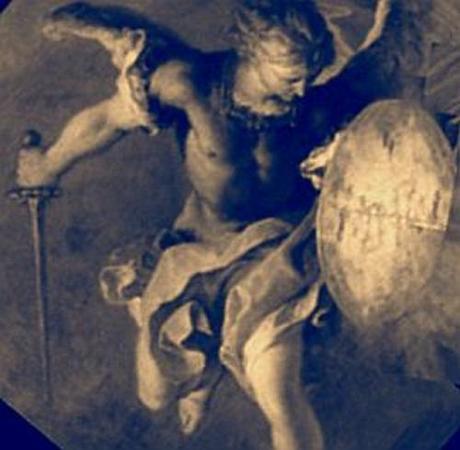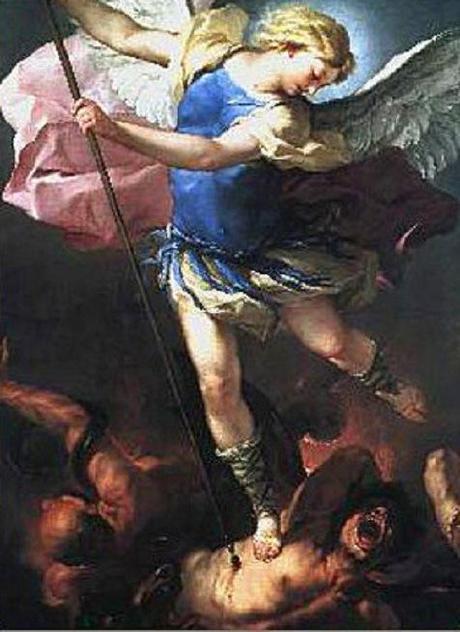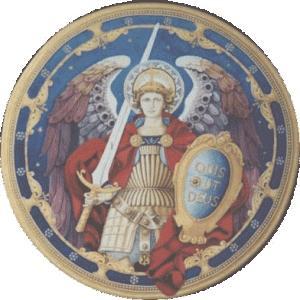Today is the Feast Day of the Archangels!
September 29 traditionally was set aside as the Feast Day of St. Michael the Archangel. (The word “saint” simply means “holy.”) Then the Church made it the feast day of all the Archangels.
Three Angels are named in the Bible:
- Michael
- Gabriel: in Hebrew, the name means “God is my might”
- Raphael: in Hebrew, the name means “God has healed”
Notice that all three names end with “El” — which means God, in Hebrew. Thus, each Archangel’s name ending in “el” means they are “of God.”

The Annunciation by Sandro Botticelli, 1485
The word “angel,” in Greek is angelos; in Hebrew is malach; in Arabic is mala’ika – which all mean “messenger.”
Angels are incorporeal (bodiless) spiritual beings who act as intermediaries between God and humanity. Angels are defined by their function as messengers or message-bearers, although this function does not exhaust their activities. As spirits, they are believed to have been created by God to serve the supreme deity by fulfilling any and all tasks assigned to them.
Major philosophers — such as Thomas Aquinas, René Descartes, John Locke, and most recently, the American philosopher Mortimer Adler — have put forth compelling reasons for the existence of Angels. (For the conversion of Adler, a Jew, to the Catholic faith, see the moving account, “A Philosopher-Pagan Comes Home“.)
Theologians maintain there is a hierarchy of Angels, due to the fact that in Genesis 3:24, Isaiah 6:1-7, Ezekiel 1, 10, Romans 8:38, Ephesians 1:21, 3:10, 6:12, Colossians 1:16, 2:10, 2:15, allusions are made to “seraphim,” “cherubim,” “thrones,” “dominions,” “mights,” “powers,” and “principalities” in the “heavenly places.”
Dionysius and St. Thomas Aquinas delineated three hierarchies of Angels, with each hierarchy comprised of three orders:
- 1st hierarchy: Seraphim, Cherubim, Thrones.
- 2nd hierarchy: Dominions, Virtues, Powers.
- 3rd hierarchy: Principalities, Archangels, Angels.
Of the nine angelic orders, five are sent by God for external ministry among bodily creatures, as indicated by their names of Virtues, Powers, Principalities, Archangels, and Angels—all of which refer to some kind of administrative or executive office. Of these five orders, only the last three minister to human beings, which suggests Virtues and Powers minister to other bodily creatures, including all the non-human animals whom St. Bonaventure called “creatures without sin”!
- Principalities are in charge of the whole of humanity.
- Archangels minister to nations — their leaders and those persons whom God tasks with special work to do on Earth.
- Angels, the last order, are God’s messengers to and guardians of individual human beings.
The name “Lucifer” means “Morning Star,” “Son of the Dawn,” or “Light Carrier.” For that reason, theologians believe that Lucifer was a high-order Angel, most likely the highest order — a Seraphim. Aquinas thought him to be “probably the highest of all the angels.” But Lucifer admires and loves himself more than his Creator and thinks himself to be “as God.” And so, swollen with narcissism and grandiosity, Lucifer rebelled, taking a third of the angelic beings with him.

Then war broke out in heaven; Michael and his angels battled against the dragon. The dragon and its angels fought back, but they did not prevail and there was no longer any place for them in heaven. The huge dragon, the ancient serpent, who is called the Devil and Satan, who deceived the whole world, was thrown down to earth, and its angels were thrown down with it. (Revelation 12:7-9)
That braveheart’s name is Micha-el, which means “Who is like God?”
I like to think “Who is like God?” is Micha-el‘s battle cry . . . .
St. Michael the Archangel is believed to be the captain or prince of the heavenly armies and the most beloved of all the Angels. He is mentioned in Daniel 10:13,31; 12:1 (where he is said to be the prince of the people of Israel); in Jude 9 (where he is said to have disputed with the devil about the body of Moses); and in Revelation 12:7 (where he is said to have led the heavenly armies against those of the great dragon).
Described in Revelation 10:1 as a “mighty angel…with a halo around his head; his face was like the sun and his feet were like pillars of fire,” St. Michael is generally portrayed by artists as wearing full armor and carrying a sword or lance, with his foot on the neck of a dragon. (Pictures of the martyred St. George are often similar, but only Micha-el has wings.)

- Patron of the Chosen People in the Old Testament.
- Patron saint and defender of the Church.
- The Angel of death, who assists Jesus in the final judgment (thus, Michael is sometimes depicted with a scale).
- Leading the good angels against the fallen angels or demons. For that reason, Christians consider St. Michael the most powerful defender of God’s people against evil. As such, Michael is also the patron saint of soldiers and policemen. (For the Prayer to St. Michael, go here.)
All of which is why St. Michael the Archangel – the Braveheart of Angels — is my most favorite saint, whom I admire and love with all my heart. He is my captain. As you can see from this blog’s masthead, he is also the protector of Fellowship of the Minds.

Happy Feast Day, St. Michael, St. Gabriel, St. Raphael!
Thank you for inspiring us with your humility, courage, goodness, and love for God.
~Eowyn
Check out FOTM’s other saints and angels posts, here!
Sources:
- Mortimer J. Adler, The Angels and Us (New York: Macmillan, 1982).
- Matthew Bunson, Angels A to Z: A Who’s Who of the Heavenly Host (New York: Three Rivers Press, 1996), pp. 181-184.
- Michael H. Brown, Prayer of the Warrior (Goleta, CA: Queenship Publishing Co., 1993), p. 34.
- René Descartes, Meditations On First Philosophy, trans. by Donald A. Cress (Indianapolis & Cambridge: Hackett Publishing Company, Inc., 1979).
- John Locke, An Essay Concerning Human Understanding, edited with an introduction by A. D. Woozley (Cleveland & New York: Meridian Books, 1968),
- Summa Theologica of St. Thomas Aquinas, Volume One(New York: Benziger Brothers, 1947).

